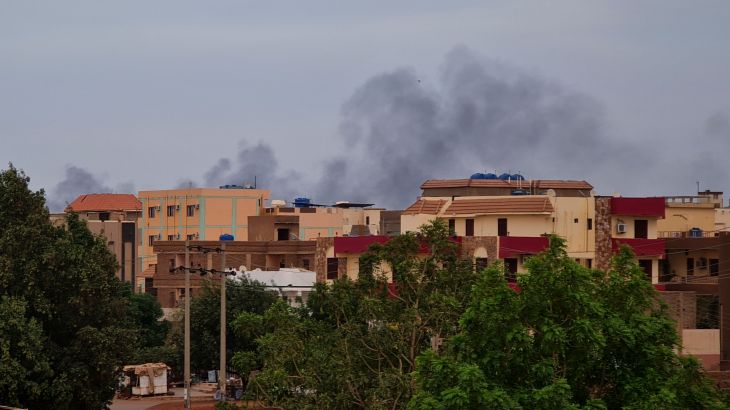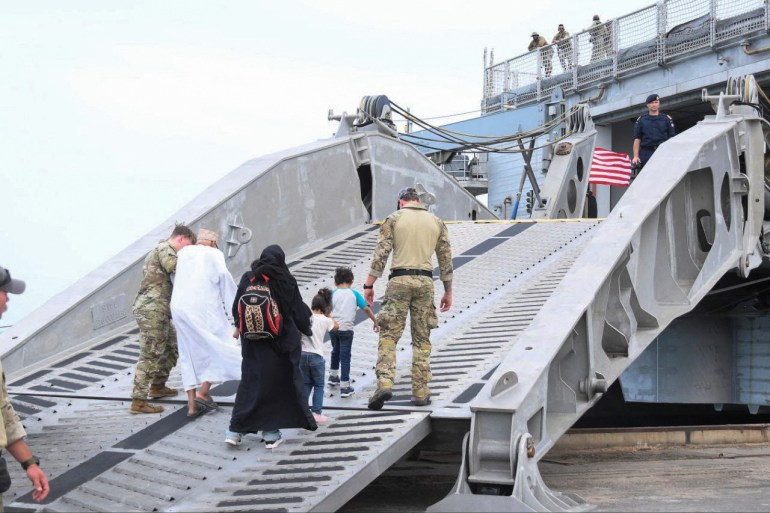Fighting continues in Sudan despite new ceasefire extension
Despite warnings of a slide towards civil war, rival military forces accuse each other of fresh violations of the ceasefire.

Sudan’s rival military forces have accused each other of fresh violations of a ceasefire as their deadly conflict rumbled on for a third week despite warnings of a slide towards civil war.
Hundreds of people have been killed and thousands wounded since a long-simmering power struggle between the Sudanese army and the paramilitary Rapid Support Forces (RSF) erupted into conflict on April 15.
Keep reading
list of 3 itemsSudanese stuck as passports locked in abandoned Western embassies
What impact does the fighting in Sudan have on Libya?
Both sides said a formal ceasefire agreement that was due to expire at midnight on Sunday would be extended for a further 72 hours, in a move the RSF said was “in response to international, regional and local calls”.
The army said it hoped what it called the “rebels” would abide by the deal, but it believed they had intended to keep up attacks. The parties have kept fighting through a series of ceasefires secured by mediators including the United States.
Al Jazeera’s Hiba Morgan said from Khartoum that people there “have not reacted much” to the extension announcement.
“They’ve seen how the previous ceasefires have played out. They’ve seen the repeated air strikes by the Sudanese army, the artillery strikes by the Rapid Support Forces,” she said. “So many of them say that this ceasefire is likely to end just like the other previous ceasefires.”
The situation in Khartoum, where the army has been battling RSF forces entrenched in residential areas, was relatively calm on Sunday morning, a Reuters journalist said, after heavy clashes were heard on Saturday evening near the city centre.
The army said on Sunday that it had destroyed RSF convoys moving towards Khartoum from the west. The RSF said the army had used artillery and warplanes to attack its positions in a number of areas in Khartoum province.
Reuters could not independently verify the reports.
‘No direct negotiations’
The fighting in Khartoum has so far seen RSF forces fan out across the city as the army tries to target them largely by using air strikes from drones and fighter jets.
The conflict has sent tens of thousands of people fleeing across Sudan’s borders and prompted warnings that the country could disintegrate, destabilising a volatile region and prompting foreign governments to scramble to evacuate their nationals.
Sudanese journalist Mohamed Alamin Ahmed told Al Jazeera from Khartoum that people there have many reasons to flee.
“People are fleeing Khartoum not only because of the humanitarian situation and the bombs that have fallen on houses of civilians because of random shelling and air strikes, but also because of looting civilians in the streets, and even inside their houses,” he told Al Jazeera.
According to the US Department of State, the US government and multinational partners have helped nearly 1,000 Americans leave Sudan since recent violence began, while a second government convoy arrived in Port Sudan on Sunday.

US citizens and others eligible for the convoy would continue on to Saudi Arabia, where personnel were staged to help facilitate emergency travel, State Department Spokesman Matthew Miller said in a statement on Sunday.
The UK announced it had arranged an extra evacuation flight from Port Sudan on the eastern Red Sea coast on Monday.
But, underlining the extent of the instability, Canada said it was ending its evacuation flights because of “dangerous conditions”.
The prospects for negotiations have appeared bleak.
“There are no direct negotiations, there are preparations for talks,” the United Nations special representative in Sudan, Volker Perthes, told journalists in Port Sudan, adding that regional and international countries were working with the two sides.
Perthes, who told Reuters on Saturday that the sides were more open to negotiations than before, said he hoped a direct meeting between representatives of the sides would be held as soon as possible aimed at “achieving an organised ceasefire with a monitoring mechanism”.
Army leader General Abdel Fattah al-Burhan has said he would never sit down with RSF chief General Mohamed Hamdan Dagalo, also known as Hemedti, who in turn said he would talk only after the army ceased hostilities.
The conflict has derailed an internationally backed political transition aimed at establishing democratic government in Sudan, where former autocratic President Omar al-Bashir was toppled in 2019 after three decades in power.
At least 528 people have been killed and 4,599 wounded in the fighting, the health ministry said. The UN has reported a similar number of dead but believes the real toll is much higher.
